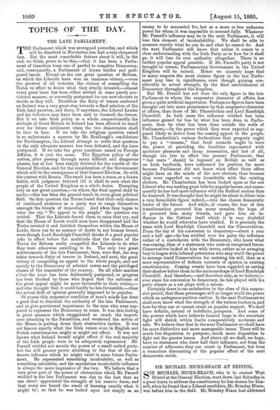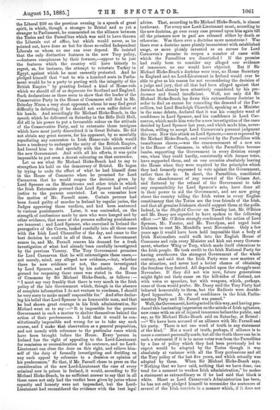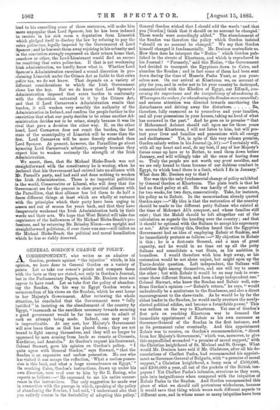SIR MICHAEL HICKS-BEACH AT BRISTOL.
SIR MICHAEL HICKS-BEACH, who is to contest West Bristol at the General Election, went down last Saturday in a great hurry to address the constituency he has chosen for him- self, when he found that a Liberal candidate, Mr. Brinsley Nixon, was before him in the field. Mr. Brinsley Nixon had addressed
the Liberal 250 on the previous evening in a speech of great spirit, in which, though a stranger to Bristol and as yet a stranger to Parliament, he commented on the alliance between the Tories and the Parnellites which was said to have thrown the Liberals out of office, but which would never, as he pointed out, have done so but for those so-called Independent Liberals on whom no one can ever depend. He insisted that the only distinctive features in the new Tory policy, —features conspicuous by their fewness,—appear to be just the features which the country will have bitterly to regret, as, for instance, the attempt to reinstate Turkey in Egypt, against which he most earnestly protested. And he pledged himself that " not to win a hundred seats in Parlia- ment would he be a party to parting with the integrity of the British Empire " by granting Ireland a kind of Home-rule which we should all of us deprecate for Scotland and England. Such declarations as these seem to show that the leader of the Conservative Party in the House of Commons will find in Mr. Brinsley Nixon a very stout opponent, whom he may find great difficulty in defeating, if he should not even suffer defeat at his hands. And accordingly Sir Michael Hicks-Beach, in the speech which he delivered on Saturday in the Rifle Drill Hall, did all in his power to put a favourable colour on the attitude of the Conservative Party, and to extenuate those intrigues which have most justly discredited it in Great Britain. He did not obtain any great success, for his opponent, by so manfully repudiating any concession to Irish Home-rule which would have a tendency to endanger the unity of the British Empire, had forced him to deal specially with the Irish surrender of the new Government. And with all his efforts, it was quite impossible to put even a decent colouring on that surrender.
Let us see what Sir Michael Hicks-Beach had to say to strengthen his hold on the democracy of Bristol. He began by trying to undo the effect of what he had himself done in the House of Commons when he promised for Lord Carnarvon that he would reopen the decision given by Lord Spencer on the Maamtrasna and other trials in which the Irish Extremists pretend that Lord Spencer had refused justice to the persons convicted. Let us remember how the motion of Mr. Parnell arose. Certain persons had been found guilty of murder in Ireland by regular juries, the Judges approving those verdicts, and had been sentenced to various punishments. Later, it was contended, on the strength of confessions made by men who were hanged and by other evidence, that some of the persons suffering punishment are innocent ; and Lord Spencer, who exercised in Ireland the prerogative of the Crown, looked carefully into all these cases with the Irish Lord Chancellor of the day, and came to the best decision he could in all of them. A new Government comes in, and Mr. Parnell renews his demand for a fresh investigation of what had already been carefully investigated by the previous Viceroy. The Tory Government promises for Lord Carnarvon that he will reinvestigate these cases,— not merely, mind, any alleged new evidence,—but, whether there be new evidence or not, the cases investigated by Lord Spencer, and settled by his authority. And the ground for reopening these cases was stated in the House of Commons by Sir Michael Hicks-Beach, as follows :- u I must say very frankly that there is very much in the Irish policy of the late Government which, though in the absence of complete information I do not venture to condemn, I should be very sorry to make myself responsible for." And after declar- ing his belief that Lord Spencer is an honourable man, and that he had shown great courage in his Irish administration, Sir Michael went on to say :—" It is impossible for the present Government in such a matter to shelter themselves behind the action of their predecessors. I hold that it would be con- stitutionally impossible and wrong for us to take any such course, and I make that observation as a general proposition, and not merely with reference to the particular cases which have been brought before the House. Every 'person in Ireland has the right of appealing to the Lord-Lieutenant for remission or reconsideration of his sentence, and no Lord- Lieutenant can close the door on this right, and relieve him- self of the duty of formally investigating and deciding on any such appeal by reference to a decision or opinion of his predecessors." So that, if Mr. Parnell chose to press on the consideration of the new Lord-Lieutenant the case of every criminal now in prison in Ireland, it would, according to Sir Michael Hicks-Beach, be no sufficient answer to say that in all these cases not only had the verdict been given by juries whose capacity and honesty were not impeached, but the Lord- Lieutenant had reconsidered the evidence with the best legal advice. That, according to Sir Michael Hicks-Beach, is almost irrelevant. For every new Lord-Lieutenant must, according to the new doctrine, go over every case pressed upon him again till all the prisoners now in gaol are released either by death or otherwise. Was there ever a doctrine more monstrous ? Was there ever a doctrine more plainly inconsistent with established usage, or more plainly invented as an excuse for Lord Carnarvon's promise to reopen a number of cases with which the Parnellites are dissatisfied ? If the promise had really been to consider any alleged new evidence of innocence, no one would have objected. But if Sir Michael Hicks-Beach's doctrine were true, no Home Secretary in England and no Lord-Lieutenant in Ireland would ever be able to give as his reason for not reconsidering the decision of a judge and jury, that all that had been alleged against that decision had already been attentively considered by his pre- decessor and found insufficient. Well, not only did Sir Michael Hicks-Beach lay down this extraordinary doctrine in order to find an excuse for conceding the demand of the Par- nellites, but Lord Randolph Churchill, speaking as a Minister in the same debate, declared that it was his complete want of confidence in Lord Spencer, and his confidence in Lord Car- narvon, which made him vote for a new investigation of the cases decided by Lord Spencer last year, and which made him, never- theless, willing to accept Lord Carnarvon's personal judgment this year. Now this attack on Lord Spencer,—never reproved by Sir Michael Hicks-Beach, and received by the Parnellites with tumultuous cheers,—was the commencement of a new era in the House of Commons, in which the Parnellites became lambs, supporting the Government in every division except one, when they could hardly, consistently with former votes, have supported them, and on one occasion absolutely leaving the House when they were required by the principles which they had formerly expressed to vote against the Government, rather than do so. In short, the Parnellites, conciliated by the abandonment of any renewal of the Crimes Act, and flattered by the refusal of the Government to take any responsibility for Lord Spencer's acts, have done all in their power to aid the Government, and are now going about the country telling the Irish voters in every English constituency that the Tories are the true friends of the Irish, and that all genuine Irishmen should support them at the polls. Indeed, in the Sheffield Courier on Tuesday last, Mr. O'Brien and Mr. Deasy are reported to have spoken to the following effect :—" Mr. O'Brien strongly condemned the action of Lord Spencer, Mr. Forster, and Mr. Trevelyan, and urged local Irishmen to oust Mr. Mundella next November. Only a few years ago it would have been held impossible that a body of Irish Nationalists could walk into the English House of Commons and ruin every Minister and kick out every Govern- ment, whether Whig or Tory, which made itself obnoxious to the Irish people. He took credit to the Irish National Party for having overthrown the strongest Government of the whole century, and said that the Irish Party were now masters of the situation, and never had a better chance of obtaining the freedom they desired. All depended upon the struggle next November. If they did not win now, future generations might fight out their cause on the hill-sides of Ireland, not with votes or speeches, but with weapons, which, perhaps,_ some of them would prefer. Mr. Deasy said the Tory Party had behaved honourably to them, but the Radicals were double- dyed hypocrites. A vote of confidence in the Irish Parlia- mentary Party and Mr. Parnell was passed."
Well, the Government, having acted in this way, and having pro- duced this fascinating impression on the minds of Irish agitators, now come with an air of injured innocence beforethe public, and say, as Sir Michael Hicks-Beach said on Saturday, at Bristol : —" We have been accused of an alliance with Mr. Parnell and his party. There is not one word of truth in any statement of the kind." Not a word of truth, perbaps, if alliance is to mean a contract personally made, but all the truth there can be in such a statement if it is to mean votes won from the Parnellites by a line of policy which they had been previously led to expect would be adopted by the Tories though it was absolutely at variance with all the Tory professions and all the Tory policy of the last five years, and which actually was adopted by them. When Sir Michael Hicks-Beach says, " Nothing that we have said, nothing that we have done, can tend for a moment to weaken Irish administration," he makes a statement as extraordinary as if he had said that black is white. Short as Lord Carnarvon's Administration has been, he has not only pledged himself to reconsider the sentences of several of the Irish convicts in a manner which, if it does not lead to his cancelling some of those sentences, will make him more unpopular than Lord Spencer, but he has been induced to receive in his sick room a deputation from Limerick which pledged itself to disobey the law by refusing to pay the extra police-tax, legally imposed by the Government of Lord Spencer; and he has sent them away rejoicing in his urbanity and in the conviction strongly expressed on their return home that, somehow or other, the Lord-Lieutenant would find an excuse for remitting that extra police-tax. If that is not weakening Irish administration, we hardly know what is. Whether Lord Spencer's Administration exercised a sound discretion in pro- claiming Limerick under the Crimes Act as liable to that extra police tax, we do not know. That depends on a variety of different considerations to which the Irish Government alone has the key. But we do know that Lord Spencer's Administration imposed that extra burden in conformity with the discretion entrusted to it by the Crimes Act, and that if Lord Carnarvon's Administration remits that burden, it will weaken very sensibly the authority of the Administration in Ireland, and confirm the people further in the conviction that what one party decides to be crime another Ad- ministration decides not to be crime, simply because it was its rival that gave a decision the other way. If, on the other hand, Lord Carnarvon does not remit the burden, the last state of the municipality of Limerick will be worse than the first. Lord Carnarvon will be more fiercely attacked than Lord Spencer. At present, however, the Parnellites go about hymning Lord Carnarvon's urbanity, expressly because they expect him to weaken seriously the strength of the Irish Administration.
We assert, then, that Sir Michael Hicks-Beach was not straightforward with the constituency he is wooing, when he declared that his Government had entered into no alliance with Mr. Parnell's party, and had said and done nothing to weaken the Irish Administration. There is no impartial politician in the world, Conservative or Liberal, who will deny that the (31-overnment are for the present in close practical alliance with the Parnellites, that that alliance has led them to do half a dozen different things at least which are wholly at variance with the principles which their party have been urging in season and out of season for years back, and that they have dangerously weakened the Irish Administration both by their words and their acts. We hope that West Bristol will take due cognisance of the hollowness of Sir Michael Hicks-Beach's pro- - fessions, and by returning Mr. Brinsley Nixon—an upright and straightforward politician, if ever there was one—will inflict on Sir Michael Hicks-Beach the political and moral humiliation which be has so richly deserved.




































 Previous page
Previous page